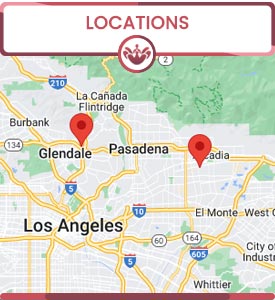How Uterine Fibroids Lead to Heavy and Painful Periods
At The OB-Gyn & Incontinence Center, Dr. Prema Kothandaraman provides care for women suffering from uterine fibroids, which can lead to heavy and painful periods. Fibroids, non-cancerous growths in the uterus, can cause increased menstrual bleeding, pelvic pressure, and pain. Dr. Kothandaraman offers personalized treatment options, from non-invasive procedures to surgery, to help manage symptoms and improve quality of life. For more information, contact us or book an appointment online. We have convenient locations to serve you in Arcadia, CA, and Glendale, CA.


Table of Contents:
Why do fibroids cause heavy menstrual bleeding?
Can fibroids make my periods more painful?
How do fibroids affect the length of my period?
Are there different types of fibroids that affect periods in different ways?
At The OB-Gyn & Incontinence Center, we specialize in diagnosing and managing a range of women’s health concerns, including uterine fibroids and their impact on menstrual health and urinary symptoms.
Fibroids—also called uterine leiomyomas—are noncancerous growths that develop in or on the uterus. Many women with fibroids experience heavy or prolonged menstrual bleeding. This happens because fibroids can increase the surface area of the uterine lining, resulting in more tissue to shed during each period. Additionally, fibroids may interfere with the uterus’s ability to contract effectively, which is essential for stopping bleeding after the lining is shed.
Certain types of fibroids, such as those that grow into the uterine cavity (submucosal fibroids), can make the uterine lining more fragile and susceptible to bleeding. Fibroids may also disrupt normal blood flow within the uterus, leading to areas where blood vessels are more fragile or dilated, further contributing to excessive menstrual bleeding. They can even affect the balance of chemicals, like prostaglandins, which help regulate menstrual cycles and blood flow.
We understand how fibroids can impact not only menstrual health but also urinary symptoms, such as increased frequency or urgency, due to pressure on the bladder. Our team is dedicated to providing comprehensive evaluation and a range of treatment options tailored to your unique needs, helping you manage symptoms and improve your quality of life.
Yes, fibroids can make your periods more painful. Fibroids are noncancerous growths that develop in or on the uterus and are a common condition we diagnose and treat at The OB-Gyn & Incontinence Center. These growths can vary in size and number, and their specific location within the uterus often influences the symptoms you experience.
When fibroids grow within the uterine wall or protrude into the uterine cavity, they can increase menstrual cramping and pain. This is because fibroids may cause the uterus to contract more forcefully during menstruation, leading to intensified menstrual cramps (known as dysmenorrhea). Along with more severe pain, you might also notice heavier bleeding, longer periods, or even blood clotting.
If you find that your periods have become increasingly painful or difficult to manage, it’s important to consult with a women’s health specialist. Our experienced team can help determine whether fibroids or another condition may be responsible for your symptoms. We offer advanced diagnostic tools and a full range of treatment options tailored to your individual needs, from medication management to minimally invasive surgical procedures.
Fibroids are noncancerous growths that develop in or on the uterus and can significantly impact menstrual cycles. One of the most common ways fibroids affect menstruation is by making periods longer and heavier than usual. This happens because fibroids can increase the surface area of the uterine lining or interfere with the uterus’s ability to contract, leading to prolonged or excessive bleeding. Some women may find their periods lasting more than a week, or notice spotting and bleeding between periods, which can be disruptive and concerning.
Our experienced team specializes in the diagnosis and management of fibroids, as well as the treatment of related menstrual and pelvic health concerns. We understand that heavy or prolonged periods can affect your quality of life and may even lead to complications like anemia. Our comprehensive care includes advanced diagnostic tools, personalized treatment options—including minimally invasive procedures—and support for managing symptoms.
If you are experiencing abnormal menstrual bleeding or suspect you may have fibroids, we encourage you to schedule a consultation at The OB-Gyn & Incontinence Center. Our dedicated providers are here to help you find effective solutions and restore your health and well-being.
We specialize in diagnosing and managing a wide range of women’s health concerns, including uterine fibroids and their impact on both menstrual health and pelvic function.
Fibroids—also known as uterine leiomyomas—are common, noncancerous growths that develop in the uterus, often during a woman’s reproductive years. The specific symptoms you experience depend largely on the type and location of your fibroids:
Submucosal fibroids grow just beneath the uterine lining (endometrium) and can extend into the uterine cavity. These fibroids are most likely to cause heavy or prolonged menstrual bleeding, sometimes with severe cramps or blood clots.
Excessive bleeding can lead to anemia and significantly impact your quality of life.
Intramural fibroids are located within the muscular wall of the uterus. As the most common type, they can also cause heavy periods and pelvic pain, particularly if they grow large enough to alter the shape of the uterus.
Subserosal fibroids develop on the outer surface of the uterus. While less likely to cause changes in menstrual flow, they may lead to symptoms that are highly relevant to our center, such as pelvic pressure, discomfort, or increased urinary frequency and urgency. This is because large subserosal fibroids can press on the bladder or other pelvic organs, sometimes contributing to incontinence.
Pedunculated fibroids are attached to the uterus by a stalk and can be either submucosal or subserosal. Their effects depend on their specific location, but submucosal types can cause significant menstrual symptoms.
We recognize that fibroids can affect not just your periods but also your pelvic and urinary health. If you are experiencing heavy or irregular periods, pelvic pain, or bothersome urinary symptoms, our team offers comprehensive evaluation and personalized treatment options tailored to your unique needs.
If you have concerns about fibroids or changes in your menstrual or urinary health, please schedule a consultation with our experienced providers. Early diagnosis and expert management can help you regain comfort and control over your health. For more information, contact us today or book an appointment online. We have convenient locations to serve you in Arcadia, CA, and Glendale, CA. We serve patients from Arcadia CA, Glendale CA, Monrovia CA, Pasadena CA, Los Angeles CA, Burbank CA, and surrounding areas.


Additional Services You May Need
▸ Urogynecology
▸ Minimally Invasive Gynecology
▸ Monalisa & Medical Aesthetics
▸ Bioidentical Hormone Replacement Therapy
▸ Urinary Incontinence
▸ Pelvic Organ Prolapse
▸ Painful Bladder
▸ Urinary Tract Infection
▸ Genitourinary Syndrome of Menopause
▸ Female Sexual Dysfunction
▸ Urinary Retention
▸ Vaginal Laxity & Prolapse
▸ Postpartum Pelvic Floor Problems
▸ PCOD
▸ Bladder Prolapse Repair
▸ Urgent PC
▸ Fibroids
▸ Excessive Bleeding
▸ Pelvic Pain
▸ Birth Control & IUD
▸ Vaginal & Pelvic Infection
▸ Monalisa Touch
▸ STD
▸ TempsureVitalia
▸ Biote Pellet Therapy
▸ Topical BHRT
▸ Flexsure
▸ Rectal Prolapse Repair
▸ Tempsure ENVI
▸ Minimally Invasive Pelvic Surgery for Incontinence



